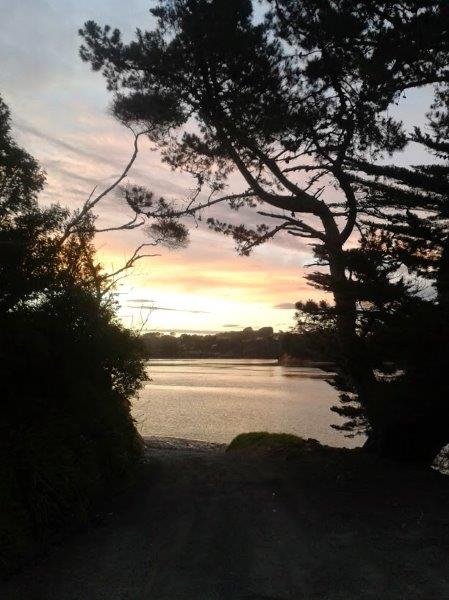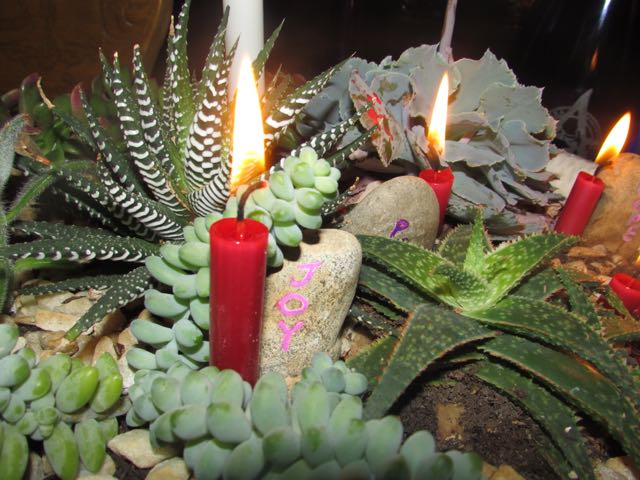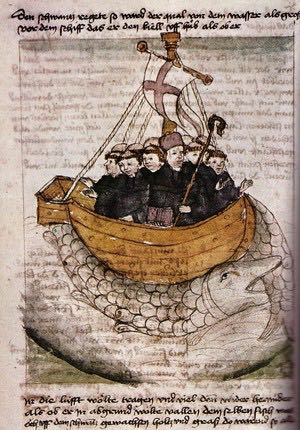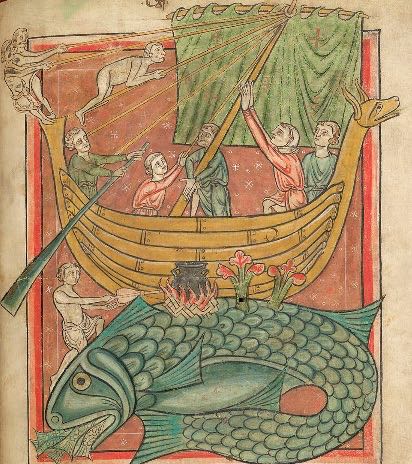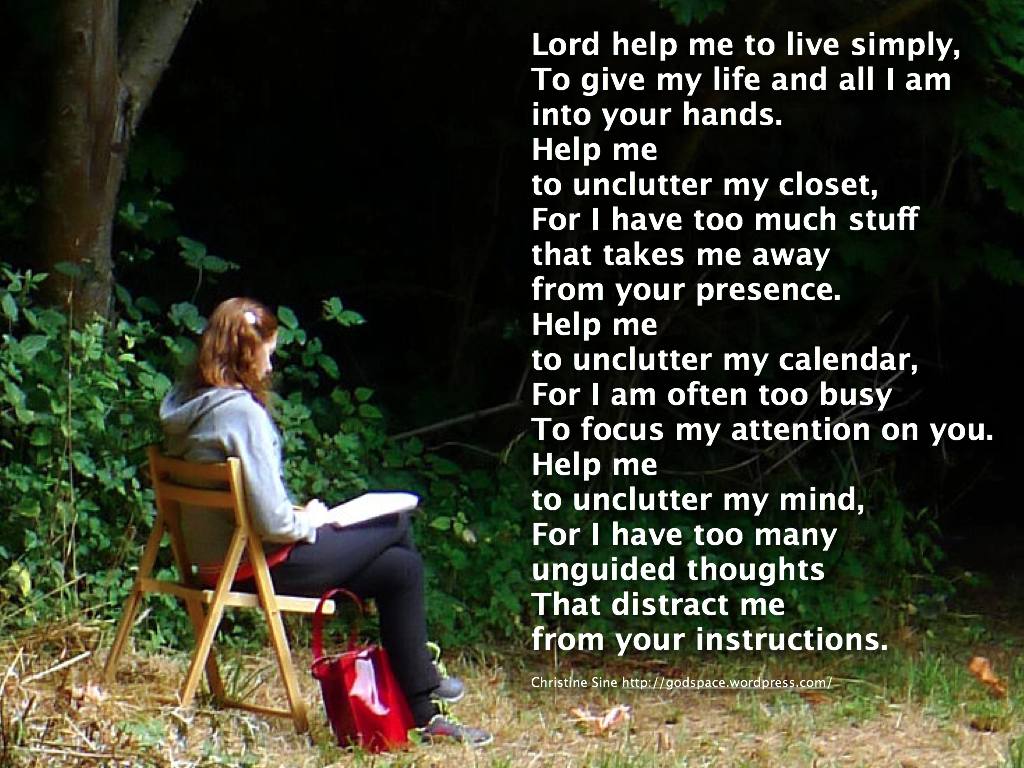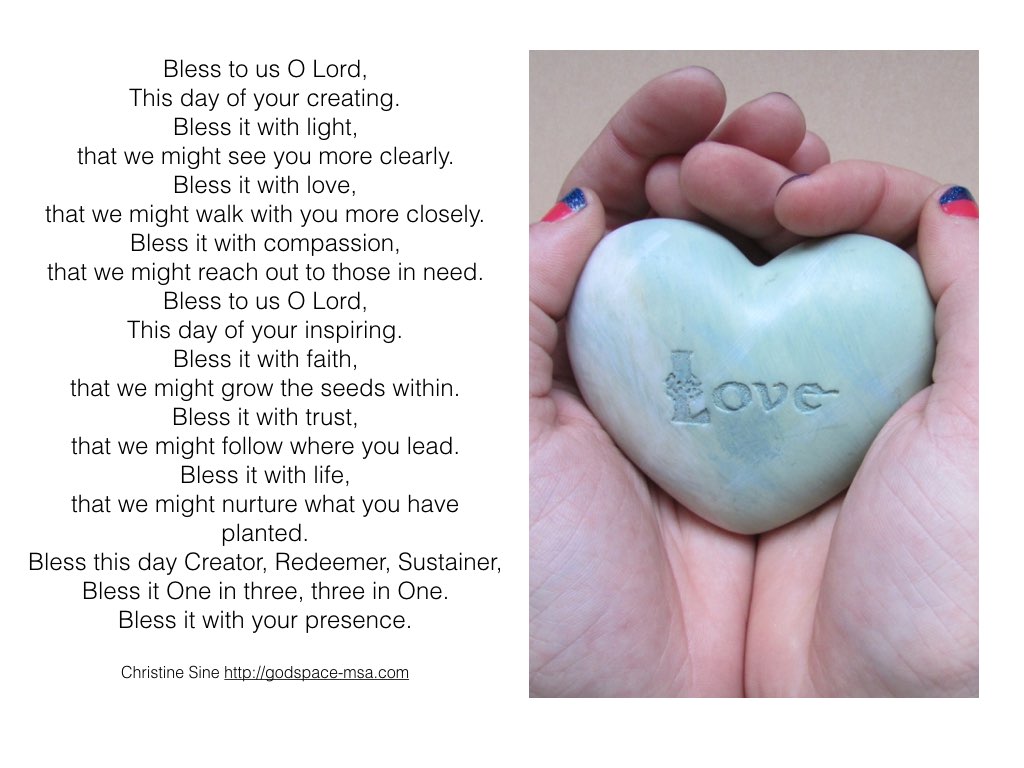Ask yourself.
What direction do you want to take?
Smooth as water,
which knows its way;
or fighting the current
for wasted gain?
Let go.
Don’t hold on tight.
God’s river runs wide, and carries us all.
His blessings kept safe,
and His purpose sure,
in His river of deep shalom.
Abide.
Don’t fight the tide.
Surrender to the waves that come.
Dive deep, to where the world grows dim.
It’s there you find your pathway clear,
gleaming as the sun.
Follow Him.
Believe He knows what is good.
He draws the ocean by the moon.
How much more has He determined,
your small affairs,
of great worth to Him.
Trust Him.
Ana Lisa de Jong
Living Tree Poetry
I felt this poem gathering momentum in my mind all day; as at work, I handled the normal stresses of the day, and tried to tap into God to keep my inner peace. I am fortunate in my work as an administrator for a Defence Chaplaincy department, to have a chapel to retreat to, and it was on my way home I took a few minutes out. I recall thinking how, even though we know better, we find ourselves feeling we need to work to please Him; or even find ourselves thinking maybe we should keep going our own way, until we have redeemed ourselves enough in our eyes to come into His presence.
On that thought, I picked up the Baptist Hymn Book and read these words from the hymn ‘Happy Band of Pilgrims’, written by John Mason Neale (1862).
‘The trials that beset you,
the sorrows ye endure,
the manifold temptations
that Death alone can cure,–
What are they, but his jewels
of right celestial worth?
What are they but the ladder,
set up to heaven on earth?’
I felt God impress on me the truth that we are to come into His presence, just as we are. Our struggles are of great import to Him, our humanity precious in His sight. By being real with God and open to Him, we find the way into His presence (as John Neale wrote, these things are but a ladder set up to heaven on earth). It’s in God’s presence we come to know Him, and know ourselves known by Him. It’s by abiding in God’s presence that we understand ourselves as His beloved, and know a deep sense of belonging. And we find ourselves transforming slowly to reflect Him; as our desire becomes more and more to please and honour Him. And if we believe ourselves to have failed in pleasing Him, it’s a soft landing – as we are held fast by God, in His river of grace.
I love getting ready for the Advent season and am already planning our activities and decorations for the season so thought you might like to do so too.
Resources for Covid Advent and Christmas
- COVID Christmas from Barefoot Theology
- Advent Word – Global Advent Calendar
- Free Christmas Resources – includes Kids ministry materials, videos, graphics, and more for your at home holiday or for your congregation’s activities from Open Life Church
- Free Activities and Resource Pack for Christmas by Twinkl
- 32 Fun Virtual Holiday Party Ideas by TeamBuilding.com
- 11 Family Virtual Christmas Celebration Ideas by Meraki Lane
- 76 ideas for Advent at Home
- Rotation.org provides helpful tips for celebrating with kids
Multicultural Resources
-
- Bread for the Resistance: 40 Devotions for Justice People
- 24 Multicultural Children’s books about Christmas
- The Ultimate List of Diverse Children’s Christmas books
- The Nutcracker in Harlem Children’s Book
- Multicultural Guide to your Advent Calendar
- Multicultural Book Advent: Books About Strong Girls
Think Outside the Box
In some ways I am a traditionalist when it comes to Advent celebrations. I love to set up our Advent wreath and decorate the Christmas tree. However I also like to get creative during the season and love to encourage others to do the same.
- Thalia on Sacraparental has put together a wonderfully creative resource list in her post: What We’re Doing This Advent: Six Families Share Their Plans.
- Colouring Books are all the rage at the moment and there are plenty of them around for Christmas. Mandy Groce at Ministry to Children has created an excellent Advent Colouring Book for Kids that can be downloaded for free. Godspace also offers Colour Your Way Through Advent and Christmas as a free download as well.
- I love these templates that Sybil MacBeth of Praying in Colour has made available for what she calls a count up, not a count down to Christmas.
- Here is a creative Advent prayer walk idea which Jodie Thomae will post during Advent this year – what she calls an ADVENTure walk.
Create an Advent Wreath
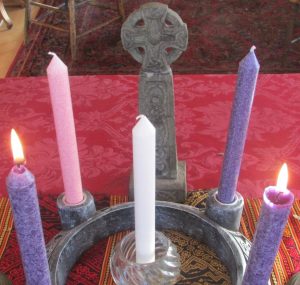
Advent Wreath
The most traditional project to prepare us for the new liturgical year is to create or acquire and advent wreath. An Advent wreath typically consists of greenery with four candles, three purple and one pink. Each candle has a specific meaning:
- Candle one (purple) represents hope. It is often called the prophets’ candle.
- Candle two (purple) represents peace. It is often called the angels’ candle.
- Candle three (pink) represents joy. It is often called the shepherds’ candle.
- Candle four (purple) represents love. It is often called the Bethlehem candle.
Many advent wreaths also include a Christ candle in the middle of the wreath.
To celebrate with an Advent wreath, you light a candle on each Sunday of Advent. The first Sunday, you light candle one; the second Sunday, you light candles one and two, etc. You can often find readings to go along with the candle lightings on the internet or at Christian bookstores. Or, find a Christmas book that represents the theme of the week and read it with your children.
There are lots of ways to make Advent wreaths. It is a fun craft to do with kids and adults alike and may establish a new family tradition for you.
Here are a few that I find useful:
- Fairly traditional Advent wreath: It does require an electric drill, fine tooth saw and wire cutters so obviously not something to let your kids do on their own.
- A Succulent Advent wreath for those of us who collect succulents, this is a great way to put them to good use over the Advent and Christmas season.
- Make a wreath to hang on your doors or windows.
- Simple Advent wreath made from an old coat hanger – great fun for all of the family.
- Low cost eco-friendly wreath – again fun to make.
- Or, perhaps a junk wheel wreath with mason jar tea light.
- And I love this one for making, among other things, an Advent wreath with children’s hand prints. One of my friends used her own and her husband’s handprints for the wreath and gave it to give to her grandkids as an Advent gift. Alternatively, get the kids to make the wreath and gift it to the grandparents!
- Go bird friendly with your Advent wreath and Advent decorations. We tried this a couple of years ago. The gelatine suggested in most of these goes moldy if you leave it inside too long, however, we planned to try it again with lard which should be more durable and also nutritious for the birds, but have not yet managed to do that.
Create an Advent or Winter Spiral
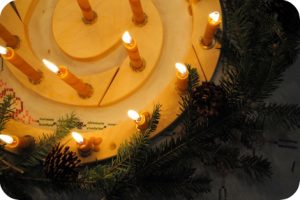
This is not a long standing Advent tradition but is associated with Waldorf schools in the United States. It has similarities to walking the labyrinth and I think is a wonderful tradition to consider establishing for your family.
- This site has great instructions for making an Advent spiral complete with Mary on a donkey with salt dough.
- Sparkle stories has another rather more ambitious outdoor winter spiral.
- Mountain Hearth has the most ambitious of all – a beautiful Advent walk that, as they say, really sets the mood for a different sort of holiday season filled with more stillness, reverence, contemplation and beauty amongst the prevalent hustle and bustle of shopping, parties, and general busyness that surrounds us in November and December.
- I love this Advent spiral design from Holland.
- And this very creative and relatively simple homemade Advent spiral – A new way to mark time
Create an Advent Garden
This is an idea that I came up with a couple of years ago when I was feeling a little bored by the traditional Advent wreath which we had used for the last 20 years. I am a keen gardener and decided to create my own mini garden specifically for Advent.
I filmed this short video to explain my process and the reasoning behind it. This was a very meaningful and fun way to celebrate the season. It has become an important Advent activity for me. This year, I will replenish the garden again, choose a word to focus on each week and move it to my office desk as a way to pause and meditate during the day.
I continue to work on this concept and find new inspiration each year. I loved this one from 2015.
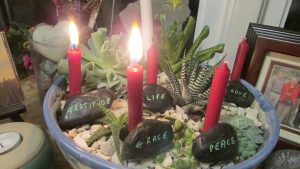
In 2016, we were traveling so I did not make a garden. Then, in 2017, I started experimenting with a little more creativity.
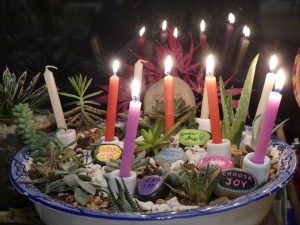
Here are some other advent gardens that I have put together over the years:
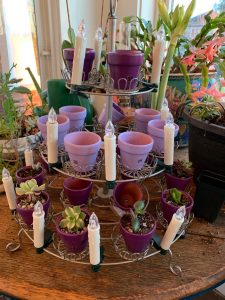
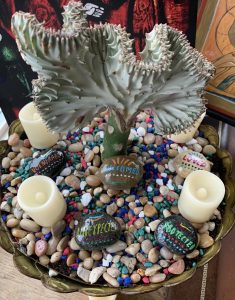
I also came across this very creative Advent calendar/garden idea that I might experiment with too.
Make Your Own Advent Calendar
Advent calendars always seem to represent the more commercial side of Christmas to me with cheap chocolates, wooden toys and glittery paper being the predominant images. However, this is a wonderful tradition and there are many ways in which we can make it meaningful for our families.
- I love the suggestion from the post Celebrating Advent with Children to make an Advent calendar with matchboxes, placing slips of paper in each one with different activities to do each day. Some of these are simple fun games to play, others are ways to reach out with acts of kindness and still others are family activities that are fun to do together.
- Advent in a Jar is a simple but effective way to help children enter into the season of Advent. Make a prayer jar with your kids in November before Advent begins. Use strips of paper rather than wood so that you can fit 24 or more days of activities, scriptures and prayer points that lead up to Christmas into your jar. Pull one out each day as a way to focus your kids attention on the real meaning of Christmas.
- Another possibility is this recycle bin Advent calendar. What a great way to introduce kids to the season and to the need to be more responsible. The combination of inward reflection and outward caring is wonderful.
- Check out this site with traditions from around the world to create your own list of traditions to talk about with your kids. You could use matchboxes or just write the name of a country on pieces of paper, put them in a jar and pull one out each day and then talk about the traditions of that country.
- CAFOD: Just One world in the U.K. has some great Advent liturgies available as well as a downloadable Advent calendar for kids.
- Susan Forshey put together this helpful Advent calendar Forty Days of Joy and Love, which is a great concept to use for your Advent calendar without investing in funky toys or more unnecessary chocolates.
- And here is a really fun one to explore – The Hubble Telescope Advent calendar
- Catholic Mom has downloadable instructions for an Advent chain which has some similarities to an Advent calendar, but is especially designed to encourage kids to think beyond themselves at Christmas.
- That Artist Woman shares an Advent Calendar that is of Mary and baby Jesus with stars surrounding their picture.
- Our store offers a FREE download of Advent in a Jar for your use this Advent
Explore Christmas traditions and recipes from around the world with your family
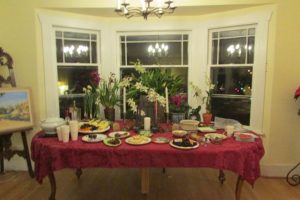 Buzzfeed life has a wonderful array of recipes associated with the Advent and Christmas season in many different parts of the world. Just reading through some of these has my mouth watering. Choose a few to make with your kids and create some special prayers for the countries the traditions come from at the same time.
Buzzfeed life has a wonderful array of recipes associated with the Advent and Christmas season in many different parts of the world. Just reading through some of these has my mouth watering. Choose a few to make with your kids and create some special prayers for the countries the traditions come from at the same time.
I love to experiment with new recipes from different parts of the world especially for our Advent Open house.
Set up a nativity set.
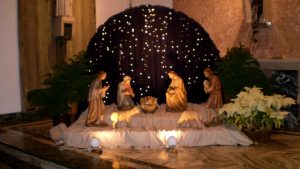 This is always a fun activity that tends to grow even more important as we age. Set it up with the manger empty and the wise men at the other end of the room or house. Throughout the Advent and Christmas season the wise men move closer to the manager and, of course, on Christmas morning, the Christ child appears in the manger.
This is always a fun activity that tends to grow even more important as we age. Set it up with the manger empty and the wise men at the other end of the room or house. Throughout the Advent and Christmas season the wise men move closer to the manager and, of course, on Christmas morning, the Christ child appears in the manger.
One of my friends has a rich collection of nativity sets from around the world which she sets up in different parts of the house to remind her that the story of Jesus is powerful in every culture. World Nativity has an amazing set of images of nativity sets from Africa, Asia, Latin America and Eastern Europe. YonderStar is another site that sells Nativity sets, many of them fair trade. They also contribute 10% of their profits to Nature Conservancy and Food for the Poor. Ten Thousand Villages also has Fair Trade nativity sets from around the world.
One creative twist on the traditional nativity set is to give each family member an empty manger on the first Sunday of Advent. A small cereal box covered with bright paper will do as well. At bedtime, the children draw straws for each kind deed performed in honor of baby Jesus as his birthday surprise. The straws are placed in the child’s manger or box daily. It is amazing how much love a child can put into Advent when she or he is preparing for his redeemer’s coming in grace.
On Christmas, each child finds an infant in his manger, placed on a small table or a chair beside his or her bed. Usually it is a tiny doll, beautifully dressed. This custom fills the child with a longing in Advent, and provides an image of the redeemer as the first happy glance in the morning and the last impression at night during the entire Christmas season.
Make a Jesse Tree
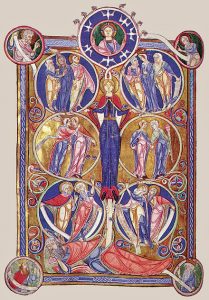 The Jesse Tree represents the family tree, or genealogy of Jesus Christ. It tells the story of God’s salvation plan, beginning with creation and continuing through the Old Testament, to the coming of the Messiah. The name comes from Isaiah 11:1, “Then a shoot will spring from the stem of Jesse, and a branch from his roots will bear fruit.” (NASB)
The Jesse Tree represents the family tree, or genealogy of Jesus Christ. It tells the story of God’s salvation plan, beginning with creation and continuing through the Old Testament, to the coming of the Messiah. The name comes from Isaiah 11:1, “Then a shoot will spring from the stem of Jesse, and a branch from his roots will bear fruit.” (NASB)
Each day of Advent, a homemade ornament is added to the Jesse Tree, a small tree made of evergreen branches. These symbolic ornaments can each represent a prophecy foretelling of Christ. Other variations include creating ornaments that represent the ancestors in the lineage of Christ, or using the various monogram symbols of Christianity as handmade ornaments. Before a symbol is hung on the branch, a Bible passage or a story from a story Bible is read.
- My Jesse Tree: The Ultimate Guide has a good explanation and lots of ideas on how to make a Jesse tree.
- Here is a free download for making a Jesse tree ornaments and another for making a more traditional Jesse tree.
- As a free gift to you all, a small way to say thank you for your prayers, support and encouragement, we offer our new Advent/Christmas colouring book, Colour Your Way Through Advent and Christmas. Colouring pages are based on the O Antiphon images drawn for us last year by Danielle Poland for our popular devotional A Journey Toward Home: Soul Travel from Advent to Lent. Additional Christmas images were created by our volunteer, Shelby Selvidge.
This is part of a series on Christmas/Advent resources.
- Advent Activities for Families and Kids for 2020
- Helping Kids Give Back This Christmas
- Celebrate With Simplicity This Christmas
- Advent/Christmas Music from a Rich Array of Traditions
- Getting Ready for Advent/Christmas Worship Resources for the Season
- Choosing Your Scripture Readings for the Coming Year
- Who Will You Invite to the Manger?
- Advent Candle Light Liturgy
- What On Earth Are The O Antiphons
Resources from Godspace for Advent and Christmas
Godspace has a variety of resources available for celebrating this season.
- NEW DEVOTIONAL! Lean Towards the Light this Advent & Christmas + Advent Cards Bundle compiled by Christine Sine and Lisa DeRosa
- Lean Towards the Light Advent Retreat Online – video sessions by Christine Sine along with handouts to prepare for the coming of the Christ Child this Advent.
- A Journey Toward Home: Soul Travel For Advent to Lent compiled by Kristin Carroccino and Christine Sine
- Waiting for the Light: An Advent Devotional compiled by Ricci Kilmer, Susan Wade and Christine Sine
- Prayer Cards – more than Christmas gifts. These have been used for daily devotions, grief counselling, small groups and congregational prayers.
Check out the entire resource list here for more ideas for Advent and Christmas.
Godspace has a number of Advent resources available for both free download and purchase. Visit our store.
by Derek Olsen
One of my favorite tales of pilgrimage is the Voyage of St. Brendan the Navigator. A tenth-century story about the life and travels of an Irish monk from the end of the sixth century, I first encountered this text at an early age, and was immediately taken with the image of a ship full of monks landing atop a whale. As I got older, I read the story again, and recognized it as an adventure story dressed as a saints’ life. As I have continued to live with it, though, I have come to the realization that there is more to it than that: it is a teaching about the life of prayer dressed as an adventure story dressed as a saints’ life.
Voyages and pilgrimages are a feature of early Irish monasticism. Modeled as it was on the lives and practices of the Desert Fathers and Mothers of Egypt, solitude and the waste places of the earth were important settings for monastic self-cultivation. We are told that Irish monks would climb into their flimsy coracles and push themselves off into the sea, trusting in God that they would arrive in some deserted place to dwell as hermits. Indeed, the Norse sagas tell of viking settlers landing in unknown terrain populated only by seals and the odd wild Irish monk.
These monastic voyages are inherently different from other kinds of pilgrimage; typically a pilgrimage is a journey to a destination and back again. The Irish trips tended to be one-way voyages into the unknown. Like Brendan, they set off in search of “the Promised Land of the Saints” guided only by the grace of God.
I can totally relate.
I often feel, like them, that life is sweeping me along to an unknown destination; that the waves and turbulence of life are threatening to swamp the delicate boat in which I ride. Juggling a relentless flood of calls upon my time and attention, I often feel like I’m just a few paddles away from complete shipwreck! And yet, as I sweep along, I have the sense I’m headed somewhere but the means of conveyance and direction of travel are not ultimately under my control.
The truth is that the monks were looking for a figurative location, not a literal one. When they went floating off in search of the “Promised Land of the Saints,” they weren’t expecting to land in a place flowing with milk and honey; they knew they would find themselves cast on some rocky shore to wrestle out the rest of their days, locked in combat with God and their own soul, warring against the passions, laboriously seeding the virtues in their habits, casting ceaseless prayers for the world and its inhabitants into the wind, and keeping watch for the incarnation of the Christ within their own hearts. This was the very opposite of escapism; alone, they had no distractions calling them away from relentless self-scrutiny and conversation with God. They were heading to a place of hard work to continue the voyage within their own souls towards the Triune God.
As I’ve learned more about the spirituality of the early monastic movements and the roots of the Desert encounter with God, the more depth I’ve found within the Voyage of St. Brendan. What I keep seeing now is that the voyage itself is a means for cultivating the destination. The habits of the voyage shape its end.
While the places that St. Brendan visits captivate the imagination, you’ll notice as you read that place has a very strong correlation with liturgical time. Brendan’s seven-year journey is a cycle, returning every year to the same locations for Maundy Thursday, Holy Saturday, the whole fifty days from Easter through Pentecost, and the Christmas season. Their wanderings amidst the wonders of the sea are liturgically structured.
Furthermore, Brendan and his monks discover not only new places and strange wonders, but new ways to pray: the Isle of the Birds and the Isle of the Strong Men in particular teach them specific patterns of prayer deeply rooted in the Liturgy of the Hours and the spirituality of the psalms that is its natural fruit.
Brendan’s journey is fraught with uncertainty and peril; he has only a vague sense of where he’s going and no idea how to get there. He has no preconceived notions of what he is going to encounter along the way, and finds everything from earthly gardens to the shores of hell itself. But what grounds him in the midst of these strange and magnificent sights is the rhythm and routine of the structured life of prayer. Steadily, over years, Brendan and his companions are transformed not just by the journey but by the practices of their journey—the repetition of prayer and praise. At their penultimate stop, they lay their eyes on a classical monastic ideal: a man whose practice of constant prayer has granted him the grace to live the life of an angel. Then, having seen this model of human life at the height of transformation, they at last walk the green and pleasant land of paradise itself.
As the seasons shift and the year turns its way towards Advent, Brendan’s voyage speaks to me of the importance of patterns, cycles, and rhythms. I’m not (thankfully!) drifting through the ocean in a coracle, but I am aware of the play of seasons and hours as I rush along in my courses. While I do not live the life of a monk, the same practices that sustained Brendan and his crew—the cycles of psalms, the rhythm of seasons—help orient me to my ultimate goal as well. As I pass through the wonders and oddities that characterize my own life, I too find it structured and supported by embracing the stability of the Church Year and the regular rhythms of the hours of prayer. In Morning and Evening Prayer, in Noon Prayer and Compline, the constant repetition of the psalms is an anchor despite the tumult around me. As I hurry my girls to school or ballet, I sometimes find the songs of the Isle of Birds (“Praise the Lord all his angels, praise him all his host”(Ps 148:2) and “Praise is due to you, O God, in Zion, and to you shall vows be performed” (Ps 65:1)) drifting through my head.
As we make our way into Advent, I invite you to take stock of your own voyage. What do you use as your own markers, your own practices of stability? How do you keep time along the way to lead you deeper into your journey into God? What are the practices that feed your soul, get stuck in your head, and recall you to the Gospel life?
American Thanksgiving is only a couple of weeks away and I thought that it was time to update my list of Thanksgiving prayers.
Last year, I posted My Favourite Thanksgiving Prayers with my favourite thanksgiving scriptures and prayers from Christian, Jewish and Native American heritages.
Earlier this year, I posted resources for thanksgiving and harvest with a rich array of prayers, litanies and links to other websites with yet more resources for harvest and thanksgiving.
You might also like to check out this Thanksgiving Litany.
Not surprising I have found a whole new array this year. I love this prayer by Samuel Pugh:
O God, when I have food,
help me to remember the hungry;
When I have work,
help me to remember the jobless;
When I have a home,
help me to remember those who have no home at all;
When I am without pain,
help me to remember those who suffer,
And remembering,
help me to destroy my complacency;
bestir my compassion,
and be concerned enough to help;
By word and deed,
those who cry out for what we take for granted.
Amen.
-Samuel F. Pugh
Paul Neeley at Global Christian Worship is one of the best collectors of beautiful seasonal music and litanies that I know including:
- This litany by JanJay Innis.
- Thanksgiving playlist from liturgy of life.
- Recording of Songs for Thanksgiving
- Litany for Thanksgiving Day
- Litany with Responses from the Psalms
I also wanted to focus on songs that I think make a good reflective focus for the season.
Here is a wonderful thanksgiving prayer sung by Johnny Cash on an episode of Dr. Quinn Medicine Woman.
And another beautiful one by Mary Chapin Carpenter:
A celebration of thankfulness in this lovely thanksgiving song by Brianna Haynes:
And last, but not least, a beautiful song by Josh Groban:
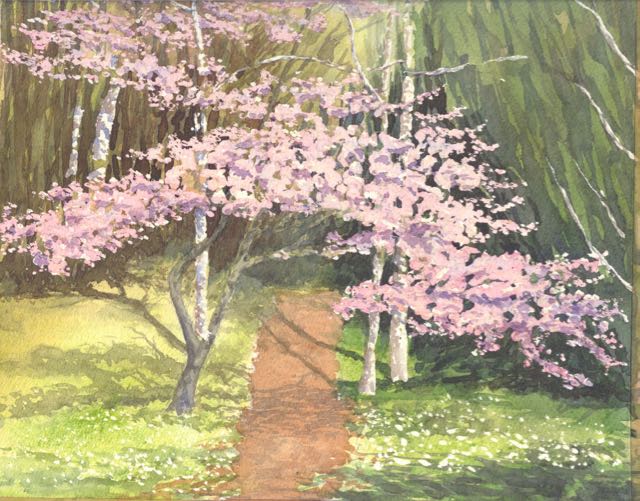
The Path Under Spring Flowers – Dave Baab
by Lynne Baab,
The first time I walked a labyrinth, there were about six other people walking it at the same time. I found myself bemused by the parallels between my walk in the labyrinth and my journey of faith. At some moments walking the labyrinth, a person would be beside me, walking on his or her own path right beside mine. Then our paths would diverge. I was reminded of close friends from certain points in my life, friends who shaped me and cared for me, but who have moved away and who I seldom see. Yes, we got to walk together for a while, but our journeys diverged.
That first labyrinth I walked was modeled after the labyrinth at Chartres, France. The path winds all over the place, and it feels like there’s no progress toward the center. In fact, there’s a section of the path furthest from the center. You walk on that outer rim, then take one turn, and boom, you’ve gotten to the center. This seemed so much like my life. Often I feel far from God, but my life takes a turn and suddenly God is present and real.
The time at the center of a labyrinth is quite special. You’ve walked a winding path to get there, and now you can stop for a minute to think and pray. Sometimes some other people are in the center with you. Maybe you don’t know them, but they know God too, so they are sisters and brothers. You are resting together in God’s presence, knowing you have to rejoin the path pretty soon and keep walking. That time at the center is like Sunday worship or other communal experiences of worship and prayer, a pause in the week to regroup with others before going back onto the journey. I may not know everyone who’s in church with me on Sunday, but together we are enjoying God’s presence in that pause from daily life.
A labyrinth is only one spiritual practice that evokes the notion of life as a journey. What are some of the other spiritual practices that help us experience the journey-like aspect of life with God?
- The Stations of the Cross. In the medieval period, very few people could travel to Jerusalem to walk the Via Dolorsa with Jesus. Walking and praying the Stations of the Cross helps everyday Christians to walk with Jesus to the cross.
- Praying while walking. I can’t tell you how many times I’ve been preoccupied, upset or angry about something. I set out on a walk, pondering and praying as I go, and when I get home, my perspective has completely changed. That one brief hour seems to expand to represent a long faith journey.
- A thankfulness list or journal. Writing down things we’re thankful for has at least two benefits. It helps us in the moment as we write, but it also helps later on when we refer back to the list. We can see the pattern of the way God has led us and blessed us on our journey.
- A prayer request list or journal. In the same was as described in #3, referring back to prayer requests, and checking them off when they’re answered, is a great way to see the pattern in our journey of faith.
- Pilgrimage. Whenever we take a physical journey for a spiritual purpose, that trip becomes a pilgrimage. We might visit a childhood home or school, a retreat center where God met us in a special way, or the setting of a significant life event. A pilgrimage is a physical journey that helps us see the journey God is leading us on in life.
- Examen. In this ancient prayer form, we are invited to look back over a period of time, perhaps one day, and look for God’s presence and also for the moments when we resisted God’s presence. Doing examen with some regularity enables us to see patterns in the places and times where we meet God and the places and times we resist God.
I wrote last month about the ways that the journey metaphor works so well to help us see moments and purpose in the life of faith. Many spiritual practices help us experience life as a journey.
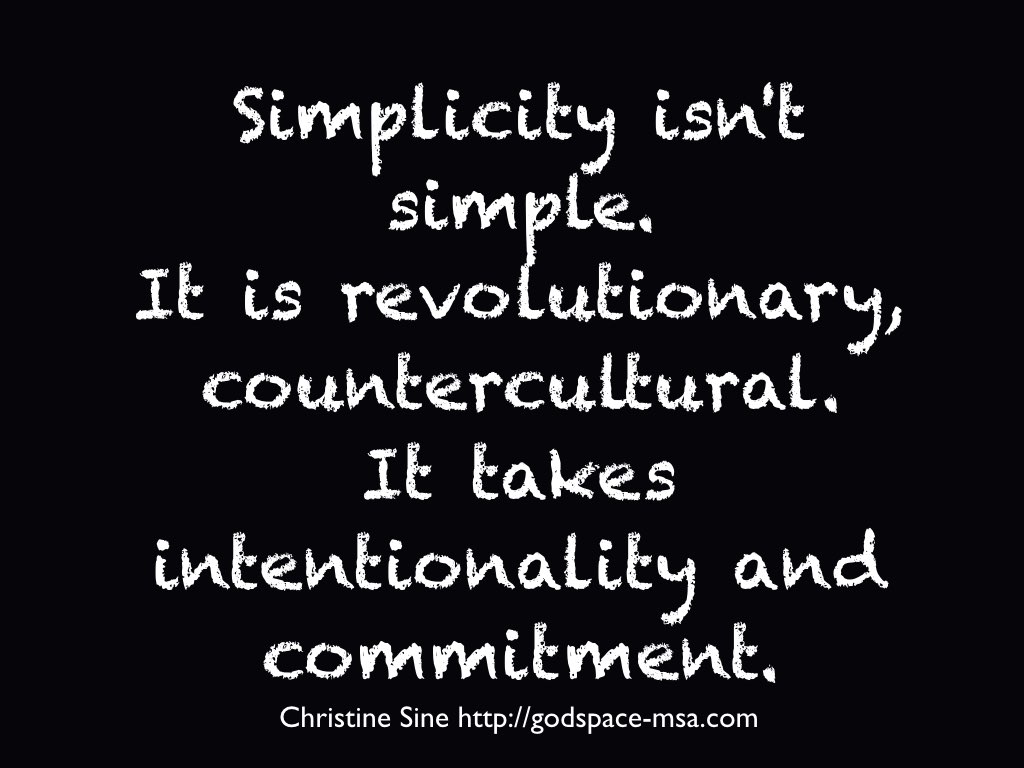 Christmas is coming. We know it well because the demons of consumerism and materialism have reared their ugly heads all around us. Hallmark has already begun their “countdown to Christmas” movies and the annual barrage of gift catalogues has hit us.
Christmas is coming. We know it well because the demons of consumerism and materialism have reared their ugly heads all around us. Hallmark has already begun their “countdown to Christmas” movies and the annual barrage of gift catalogues has hit us.
Most of us find ourselves in a real bind at this season. Do we have a gift-free Christmas and turn our backs entirely on consumerism? Do we buy only gifts that come from fair trade, slave free, or local organization and feel that we are making difference with our purchases? Or do we develop a “holier-than-thou” attitude and turn our backs completely on the secular celebration of the season?
If we are honest, we all struggle with these issues and are not sure how to enter into the true spirit of Christmas without disappointing our kids or denying our own enjoyment of Christmas goodies and unexpected presents. Simplify Christmas, Celebrate Christ, we tell ourselves while hoping that we will find a new iPhone under the tree.
For most of us, our simplification of Christmas is a compromise that hopefully does focus more on the celebration of the birth of Christ than on the secular materialistic spirit of the season. If you are struggling with these issues, here are some thoughts to reflect on before the season gets into full swing.
Simplify Christmas.
When I posted this prayer and talked about the need to simplify, the traffic on the blog zoomed. People everywhere are looking for resources to help them keep their time and resources under control. People of faith are looking for a new rhythm that will enable them to truly focus on the presence of Christ and bear witness to the love of God.
Here are a couple of resources to explore to help:
- Buy Nothing Christmas
- Unplug the Christmas Machine
- Simple Living Works is a great resource for simplifying our lives, not just at Christmas, but all year long. I particularly recommend listening to some of their “Whose Birthday Is It Anyway?” podcasts.
- Christmas Gifts that Won’t Break provides weekly Advent reading, looks at spiritual gifts that bring hope, peace, joy, and love to family, community, and world and challenges people to rethink the gifts they ask for and give during the Advent and Christmas seasons.
- Only give gifts of homemade toys and/or crafts
- Give toys away at Christmas rather than accumulating more.
- Host a toy exchange with friends.
Think About Going Green
How about a living Christmas tree this year? We have used a living tree for many years and most nurseries have them available in many different sizes. You may want to plant the tree outside when you are finished with it, or, like us, put it outside still in the pot to keep growing until next year. Trees like this often survive for many years as long as you do not bring them inside.
Also, for some ideas for thinking about sustainability at Christmas time, check out: How To Have A Green Christmas. I love some of their suggestions like a battery-free Christmas, connecting to nature and alternatives to gift wrapping. They also have some excellent suggestions on sustainable giving that will probably be added to my master list next year.
With limited travel this year due to COVID-19, we will most likely be saving fossil fuels and other energy resources by staying home and staying connected to friends and family through video chats and other distant socializing platforms. Consider how this is impacting the earth during your holiday season!
Celebrate Advent and Keep the Christmas Festivities For Christmas.
Advent begins November 29th. In the liturgical calendar this is the season of waiting, leading up to Christmas. This post by Charlie Clauss has some great thoughts on why this matters. To truly enter into the spirit of Advent, I try to get my Christmas shopping done early. It helps keep me focused on the real meaning of the countdown to Christmas.
I start my Advent preparations early, refurbishing my Advent garden and going on retreat to clear my mind and set priorities for the season. This is a great discipline for me that helps me both focus and simplify.
Give Christmas Away This Year
Consider alternative celebrations to the usual Christmas parties. A couple of years ago, MSA team member Cindy Todd made soap for an event at Church of the Beloved in Edmonds, WA, whose theme was – A Slave Free Christmas. It highlighted making or buying articles that were made without slave labour. Participants also watched and talked about the film Dreams Die Hard and talked about the issues of slavery still present in the United States.
Pay more for less when you buy gifts. Tom and I are Christmas people and, to be honest, could not really imagine no gifts at Christmas, but we do restrict our gift-giving and try to buy locally produced or fair trade items as much as possible. One of my good friends receives a monthly package of coffee from Camano Island Coffee Roasters which partners with Agros to enable communities in Central America to get on their feet. There are a growing array of stores that provide fair traded gifts in everything from clothing to soccer balls.
One of my favourite places to shop at this season is Ten Thousand Villages.
Consider alternative charitable gifts to organizations like World Concern, and Heifer Project that provide animals and other gifts for people in impoverished communities to enable them to start small businesses.
Consider gifts from the Godspace store this Christmas. Godspace also has a number of Advent and Christmas resources that make great gifts too. Our prayer cards make great stocking stuffers and can be used throughout the year to bring rhythm and reflection into peoples’ lives.
Give away one day’s wages to an organization of your choice – like One Days Wages – that works to overcome poverty.
Watch these videos
This one from A New American Dream is a good one for reflecting on the values that underly your Christmas expenditure. Is Christ truly at the center of your celebrations?
This one from Advent Conspiracy is even more compelling. Watch it prayerfully. What changes might God ask of you this Christmas season?
[AC] Promo – Living Water International from Advent Conspiracy on Vimeo.
This is part of a series on Christmas/Advent resources.
- Advent Activities for Families and Kids for 2020
- Helping Kids Give Back This Christmas
- Advent/Christmas Music from a Rich Array of Traditions
- Getting Ready for Advent/Christmas Worship Resources for the Season
- Choosing Your Scripture Readings for the Coming Year
- Who Will You Invite to the Manger?
- Advent Candle Light Liturgy
- What On Earth Are The O Antiphons
Resources from Godspace for Advent and Christmas
Godspace has a variety of resources available for celebrating this season.
- Lean Towards the Light this Advent & Christmas + Advent Cards Bundle compiled by Christine Sine and Lisa DeRosa
- Lean Towards the Light Advent Retreat Online – video sessions by Christine Sine along with handouts to prepare for the coming of the Christ Child this Advent.
- A Journey Toward Home: Soul Travel For Advent to Lent compiled by Kristin Carroccino and Christine Sine
- Waiting for the Light: An Advent Devotional compiled by Ricci Kilmer, Susan Wade and Christine Sine
- Prayer Cards – more than Christmas gifts. These have been used for daily devotions, grief counseling, small groups and congregational prayers.
Check out the entire resource list here for more ideas for Advent and Christmas.
Godspace has a number of Advent resources available for both free download and purchase. Visit our store.
As an Amazon affiliate, I earn on qualified purchases.
I love to knit, to take photos, write prayers and plant gardens. Each creative act crafts something unique. It holds something of my love for the person I create it, and something of my love for God. It holds part of who I am and of whom I think they are. I am blessed in its creating and I hope that others will be blessed in its sharing.
As I sit here pondering this today I think “This is something like the blessing of God.” It is present in every creative act that God performs. It holds something of who God is and who God hopes we will be come. It is always with us, – in snowflakes and raindrops, in sunsets and starry nights, in the faces of friends and strangers – waiting to be unveiled in the simple mundanes acts and trivial details of our lives. This is both awe inspiring and breath stopping.
What is your response?
Look around you at the beauty of God’s creation. Stand in the rain, allow the wind to blow through your hair, pick up a fallen leaf or crouch down and take notice of the greenery sprouting up between the concrete slabs. In what ways do these reflect the love and blessings of God? What could you do today to make you more aware of these blessings?
To see the world more clearly doesn’t mean to suddenly have 20/20 vision or invest in a powerful microscope. Nor does it mean to light a brighter light to see by. We see the world more clearly when we recognize the blessings of God all around and gives thanks to our Creator who is able to bless us with revelation through the smallest grain of sand and the mightiest waterfall.
What is your response?
Think about your past week. In what ways has the great Creator of all things been revealed more clearly through what you have seen and done? Write down your revelations. Now think about the week ahead. Are there images that come to mind even now of situations that could become wonderful revelations of the blessings of God?
Now watch the video below. Take special note of the ways that the photographer uses light to emphasize the revelation of God. Sit quietly after you watch it and think of the changing lights in your life that also reveal the blessings of God. Offer up a prayer of thanksgiving to God.
As an Amazon Associate, I receive a small amount for purchases made through appropriate links.
Thank you for supporting Godspace in this way.
When referencing or quoting Godspace Light, please be sure to include the Author (Christine Sine unless otherwise noted), the Title of the article or resource, the Source link where appropriate, and ©Godspacelight.com. Thank you!

